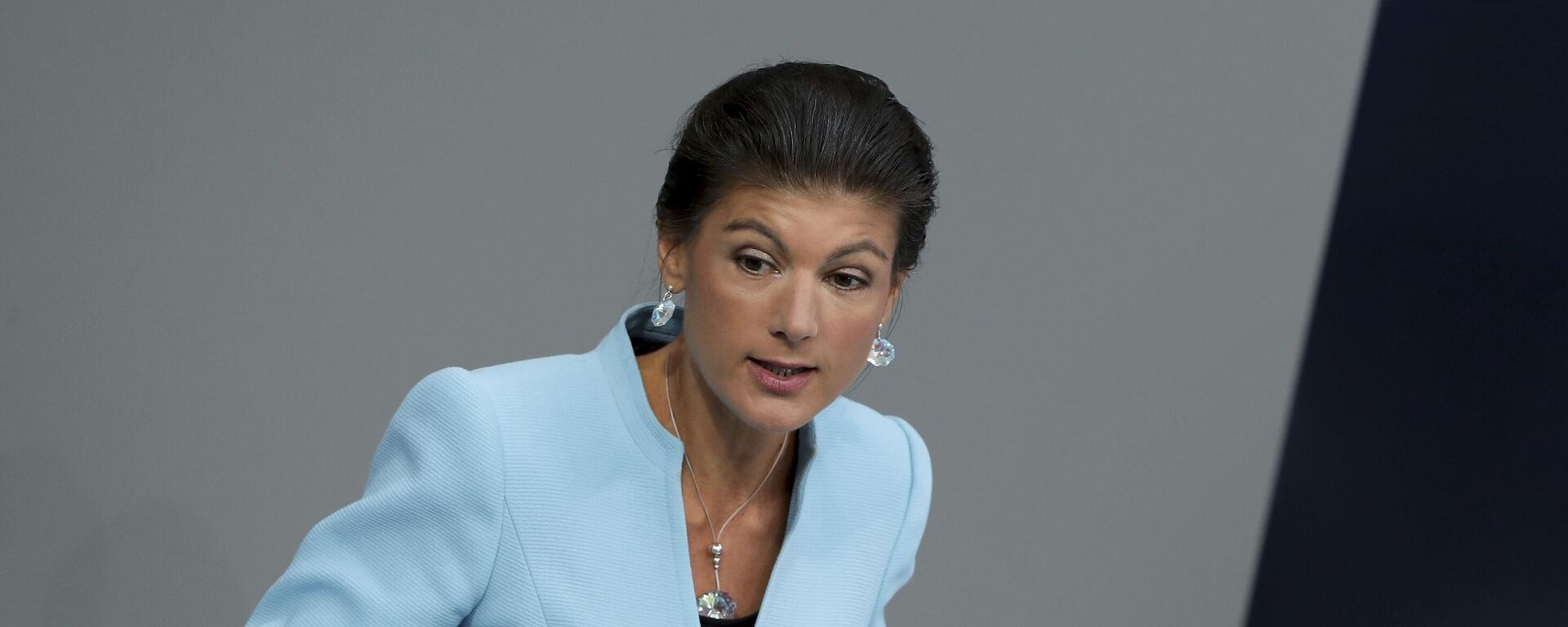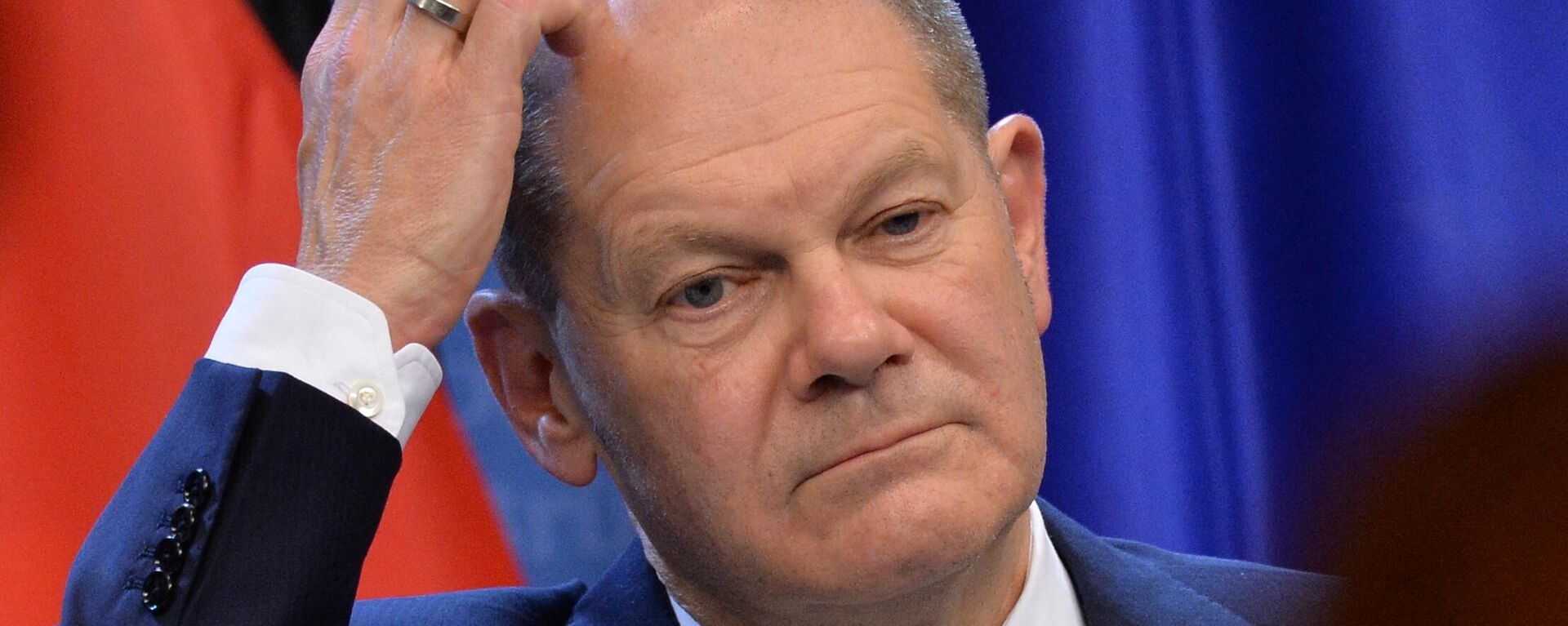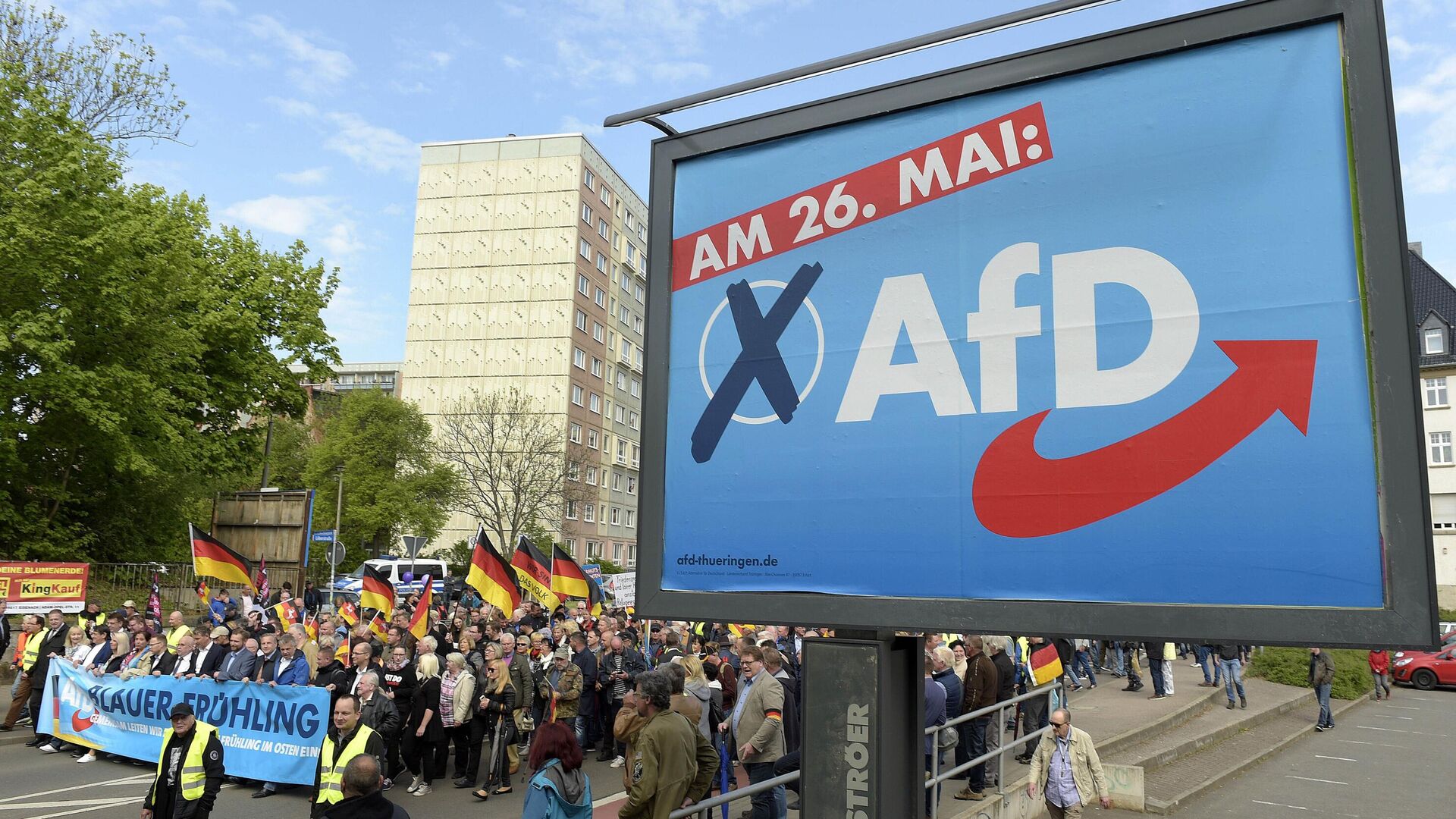https://sputnikglobe.com/20240904/anxiety-within-germany-about-its-future-afd--bsw-take-east-germany-by-storm-1120004676.html
'Anxiety Within Germany About Its Future': AfD & BSW Take East Germany by Storm
'Anxiety Within Germany About Its Future': AfD & BSW Take East Germany by Storm
Sputnik International
Dr. George Szamuely, a senior research fellow at the Global Policy Institute and author joined Sputnik’s Fault Lines on Tuesday to discuss the recent election
2024-09-04T00:57+0000
2024-09-04T00:57+0000
2024-09-04T01:12+0000
analysis
europe
olaf scholz
george szamuely
germany
saxony
christian democratic union (cdu)
ukraine
alternative fuer deutschland (afd)
nord stream
https://cdn1.img.sputnikglobe.com/img/07e8/09/04/1120006682_0:190:2965:1858_1920x0_80_0_0_b570bb55bc7487f5b4d956f6e68b5823.jpg
Germany’s right-wing party, the Alternative für Deutschland (AfD) received an unprecedented number of votes this weekend, pushing the party to second place behind the conservative Christian Democratic Union party (CDU) in Saxony with 30.6% of the vote. And in Thuringia, the AfD won its first German regional election by almost 10 points with 32.8% of the vote, and was followed by the Christian Democratic Union (CDU) which secured 23.6% of the voted according to exit polls.Dr. George Szamuely, a senior research fellow at the Global Policy Institute and author joined Sputnik’s Fault Lines on Tuesday to discuss the recent election. While the AfD’s success in East Germany cannot be denied, Szamuely suggests that their ability to actually form a government will be much more difficult.“And, as long as the AfD is still stuck in the early 30s in terms of percentage, then this policy can succeed. So the question is then can the AfD make further progress and move to the level of, you know, into the 40s or maybe even the 50s so that it can actually form a government and that's not immediately clear that it can be done," he added.The AfD’s victory in East Germany was not only a “vote of no confidence in the ruling traffic light coalition” but also showed the political division in Germany some 34 years after its reunification, said Dr. Gregor Spitzen, a German political analyst and independent journalist, who spoke to Sputnik on Monday. The analyst explained that East Germans think more critically about “anti-Russian” narratives in the media, and that some older East Germans still regard Russians as “good friends” and “useful trading partners”.Sahra Wagenknecht started the Sahra Wagenknecht Alliance (BSW) in January, but the party has grown in popularity after it came in third in three states - in former East Germany - in elections on Sunday, as Germany’s more mainstream parties are losing support.The AfD has suggested that increasing arms supplies and financial assistance to Kiev will not help end the conflict in Ukraine. Tino Chrupalla, the co-leader of the right-wing party, said in an interview on Saturday that there is “always readiness for negotiations”, Sputnik reported citing a German newspaper."There is always readiness for negotiations. We also realize that even with more weapons and increased financial assistance this war will not end. And the population is naturally scared of the spillover to Poland and also to Germany," Chrupalla said.“...Volkswagen is planning to close one of its plants. That's very big news," he added. "Volkswagen is one of Germany's manufacturing powerhouses. [...] So, there's a great deal of concern in Germany that it's losing its economic status. And, of course, then there's the war in Ukraine, and the energy cost that has piled up on Germany, and the issue of Nord Stream,” he added.Scholz described Germany’s election results on Sunday as “bitter”, and added that “all democratic parties are now called upon to form stable governments without right-wing extremists… Our country cannot and must not become accustomed to this.”The German leader vowed to strengthen weapons and deportation laws following a deadly mass stabbing in the western city of Solingen in late August. A suspected Islamic extremist killed three people and injured eight others during a street festival that marked the city’s 650th anniversary. A 26-Syrian asylum-seeker reportedly turned himself over to the police, while admitting to the assault. “Scholz’s view that somehow [they] have to create this firewall against the AfD, but that's really the only thing that they have,” the analyst added. “They don't really have any ideas about, well, how do [to] change policy? Maybe if we change policy, then that would undercut the support for the AfD, but that never really occurs to them.”
https://sputnikglobe.com/20240811/us-missiles-in-germany-would-place-target-on-berlins-back---german-politician-1119720634.html
https://sputnikglobe.com/20240903/scholzs-pro-war-policy-faces-setback-in-eastern-germany-elections-1119990527.html
germany
saxony
ukraine
Sputnik International
feedback@sputniknews.com
+74956456601
MIA „Rossiya Segodnya“
2024
News
en_EN
Sputnik International
feedback@sputniknews.com
+74956456601
MIA „Rossiya Segodnya“
Sputnik International
feedback@sputniknews.com
+74956456601
MIA „Rossiya Segodnya“
germany, elections, polls, afd, bsw, sahra wagenknecht, german politics, german elections, parliamentary elections, local elections, ukraine crisis, ukraine conflict, arms sales, arms supplies, weapons supply, weapons sales
germany, elections, polls, afd, bsw, sahra wagenknecht, german politics, german elections, parliamentary elections, local elections, ukraine crisis, ukraine conflict, arms sales, arms supplies, weapons supply, weapons sales
'Anxiety Within Germany About Its Future': AfD & BSW Take East Germany by Storm
00:57 GMT 04.09.2024 (Updated: 01:12 GMT 04.09.2024) The party’s popularity is largely thanks to the country's economic woes, as Germans are increasingly exhausted of seeing their government provide financial assistance to outside sources. But the party’s proximity to the former German Nazi party may be one politician's secret weapon.
Germany’s right-wing party, the Alternative für Deutschland (AfD) received an unprecedented number of votes this
weekend, pushing the party to second place behind the conservative Christian Democratic Union party (CDU) in Saxony with 30.6% of the vote. And in Thuringia, the AfD won its first German regional election by almost 10 points with 32.8% of the vote, and was followed by the Christian Democratic Union (CDU) which secured 23.6% of the voted according to exit polls.
Dr. George Szamuely, a senior research fellow at the Global Policy Institute and author joined
Sputnik’s Fault Lines on Tuesday to discuss the recent election. While the AfD’s success in East Germany cannot be denied, Szamuely suggests that their ability to actually form a government will be much more difficult.
“...these two states in the east of Germany, Thuringia and Saxony have been the stronghold of the AfD ever since the AfD came into existence, which was only about 12 years ago. So, the polls were showing that it would do very well and the polls were pretty accurate that they would win in Thuringia and would come a very very close second in Saxony,” Szamuely explained.
“Now, the problem, I think, for the AfD is that despite that this is obviously a good result for them, is that these are their strongholds and they need to do a lot better to be able to form a government,” he added. “Because what's happening now in Germany is that the German political and media establishment have come together and say we must under all circumstances keep the AfD out of power…”
“And, as long as the AfD is still stuck in the early 30s in terms of percentage, then this policy can succeed. So the question is then can the AfD make further progress and move to the level of, you know, into the 40s or maybe even the 50s so that it can actually form a government and that's not immediately clear that it can be done," he added.

11 August 2024, 11:26 GMT
The AfD’s victory in East Germany was not only a “vote of no confidence in the ruling traffic light coalition” but also showed the political division in Germany some 34 years after its reunification, said Dr. Gregor Spitzen, a German political analyst and independent journalist, who spoke to Sputnik on Monday. The analyst explained that East Germans think more critically about “anti-Russian” narratives in the media, and that some older East Germans still regard Russians as “good friends” and “useful trading partners”. “...they can certainly shut the AfD out because the Christian Democrats, who won in Saxony and came in second in Thuringia, they would be the core of any coalition government and they could probably count on the Social Democrats who managed to exceed the five percent threshold in order to get some kind of representation in the state parliament,” said Szamuely.
“So, they would join any coalition. The problem then arises with this new left party, which is the Bündnis Sahra Wagenknecht, this is absolutely brand new and she did very well and she would probably have to agree to join any coalition government, otherwise they just don't have the numbers.”
Sahra Wagenknecht started the Sahra Wagenknecht Alliance (BSW) in January, but the party has grown in popularity after it came in third in three states - in former East Germany - in elections on Sunday, as Germany’s more mainstream parties are losing support.
“Now, the problem there is that she has insisted that she would only join a coalition if the government would commit to winding out the war in Ukraine,” he added. “...if they don't do that and she does join this government, then that would discredit her and she would then do very poorly in the federal elections, which is about a year's time.”
The AfD has suggested that increasing arms supplies and financial assistance to Kiev will not help end the conflict in Ukraine. Tino Chrupalla, the co-leader of the right-wing party, said in an interview on Saturday that there is “always readiness for negotiations”, Sputnik reported citing a German newspaper. "There is always readiness for negotiations. We also realize that even with more weapons and increased financial assistance this war will not end. And the population is naturally scared of the spillover to Poland and also to Germany," Chrupalla said.
“Immigration is a huge issue, obviously, for the AfD [...] but Sahra’s party, which is a kind of a left-wing populist party, has also taken a very hard line on immigration. It also says, hey, the more people we import, the more it reduces the value of labor. It undercuts wages here. It's a huge burden on the state, and it's an unfair tax on working people. So she takes an anti-immigrant stance more from the left than from the right,” the analyst explained.
“...but there's also the issue of the economy and Germany's exorbitant energy cost. Part of that has come about because of the Germany's commitment to this net zero and the Green New Deal, which has seen German energy process soaring and has led to the German loss of competitiveness, German deindustrialization, which is causing a great deal of concern in a country like Germany, which depends on exports of its high-quality products, and it's being essentially kind of like the manufacturing powerhouse of Europe,” Szamuely explained.
“...
Volkswagen is planning to close one of its plants. That's very big news," he added.
"Volkswagen is one of Germany's manufacturing powerhouses. [...] So, there's a great deal of concern in Germany that it's losing its economic status. And, of course, then there's the war in Ukraine, and the energy cost that has piled up on Germany, and the issue of Nord Stream,” he added.
“And Nord Stream has been brought up certainly by the AFD, but particularly by Sahra Wagenknecht, who says that if Germany knew about this attack on Nord Stream in advance [...] then this is the biggest scandal in German history, and she's calling for an investigation of who knew what and when. So, there's a lot of anxiety within Germany about its future.”
Scholz described Germany’s election results on Sunday as “bitter”, and added that “all democratic parties are now called upon to form stable governments without right-wing extremists… Our country cannot and must not become accustomed to this.” The German leader vowed to strengthen weapons and deportation laws following a deadly mass stabbing in the western city of Solingen in late
August. A suspected Islamic extremist killed three people and injured eight others during a street festival that marked the city’s 650th anniversary. A 26-Syrian asylum-seeker reportedly turned himself over to the police, while admitting to the assault.
“I think the public despises [Scholz] for being a very weak, ineffectual leader. I think they feel that this is a very weak, ineffectual government. He will almost certainly lose the elections in a year's time, so he's not going to be chancellor for more than another 12 months,” Szamuely explained.
“Scholz’s view that somehow [they] have to create this firewall against the AfD, but that's really the only thing that they have,” the analyst added. “They don't really have any ideas about, well, how do [to] change policy? Maybe if we change policy, then that would undercut the support for the AfD, but that never really occurs to them.”

3 September 2024, 03:29 GMT




